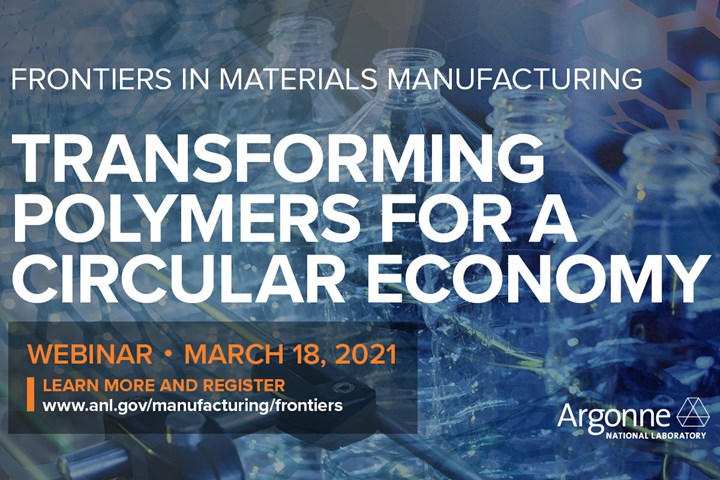DOE’s Argonne National Lab Scientists Host Webinar on Plastic Waste
Scientists to discuss market and technological drivers and survey a few of the most promising frontiers that will play key role in addressing plastic waste.
On March 18, the U.S. Department of Energy’s Argonne National Laboratory is hosting a webinar whereby a group of scientists will address the challenge of plastic and other polymeric waste. (A video recording will be posted for everyone after the event.)
Experts from industry, government, and academia will discuss the market and technological drivers at play, articulate the value proposition for companies to innovate in polymers, and survey a few of the most promising scientific and technological frontiers that will play key roles in growing the circular economy in polymers.

The webinar will also feature a live tour of the state-of-the art equipment, technologies, and computational resources available to industry partners at the U.S. Department of Energy’s (DOE) Argonne National Laboratory, including its newly expanded Materials Engineering Research Facility.
In the Transforming Polymers for a Circular webinar, Cynthia Jenks, Director of Chemical Sciences and Engineering Division at Argonne, will kick off the conversations on several questions:
▪ What prevents large-scale recycling and reprocessing of polymeric materials today?
▪ How might innovating in polymer recycling, upcycling, deconstruction, and design-for-recyclability unlock value for industry and society?
▪ What scientific advances are promising, and what helps scale the corresponding process technologies?
▪ How can public-private partnerships support U.S. competitiveness?
According to the scientists, in addition to the plastics waste impact on the environment, we also lose material that might have significant end-of-life value if recycling and other reprocessing technologies were more cost-effective. They maintain that we have an opportunity to improve the energy and material efficiency of processes that would help recycle, upcycle and deconstruct polymers on scales that are not possible today. We also have the chance to design and manufacture polymers with recycling in mind: enabling, in other words, a more circular economy. Participating experts include:
Ron Abbott, Sustainability Technical Manager, Chevron Phillips Chemical Company
Gretchen Baier, Executive External Strategy and Communications Leader, Dow
Max Delferro, Chemist and Group Leader for Catalysis Science, Argonne National Laboratory
Juan de Pablo, Vice President for National Laboratories, Science Strategy, Innovation, and Global Initiatives, and Liew Family Professor of Molecular Engineering, University of Chicago; Senior Scientist, Argonne National Laboratory
Jay Fitzgerald, Chief Scientist in the Bioenergy Technologies Office, U.S. Department of Energy
Michelle Hoffmann, Senior Vice President of Deep Tech, P33
Eric Klingenberg, Materials Science Lead, Mars Inc.
Jack Lewnard, Program Director in the Advanced Research Projects Agency–Energy (ARPA-E), U.S. Department of Energy
Related Content
-
At NPE2024, Follow These Megatrends in Materials and Additives
Offerings range from recycled, biobased, biodegradable and monomaterial structures that enhance recyclability to additives that are more efficient, sustainable and safer to use.
-
‘Monomaterial’ Trend in Packaging and Beyond Will Only Thrive
In terms of sustainability measures, monomaterial structures are already making good headway and will evolve even further.
-
General Polymers Thermoplastics to Further Expand Distribution Business
NPE2024: Following the company’s recent partnership buyout, new North American geographic territories are in its sight.
















